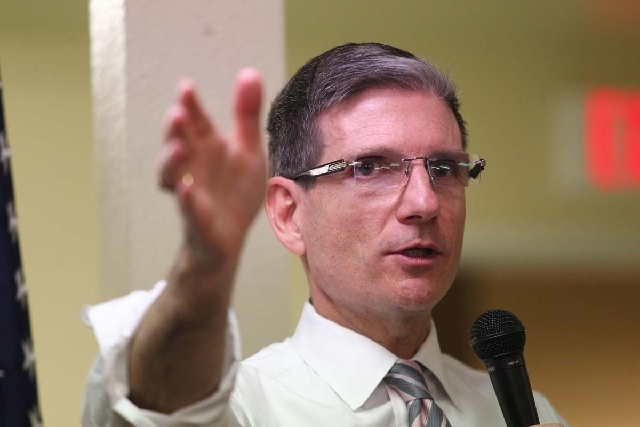On immigration reform, Joe Heck walks, talks straight line
Rep. Joe Heck can sure draw a crowd.
The Republican congressman packed the house at the monthly breakfast meeting of Hispanics in Politics this week, and there wasn’t much question why: People wanted to hear about immigration reform.
Now that the U.S. Senate has passed a comprehensive immigration reform bill — with the support of both Nevada senators — attention shifts to the House. Heck called the Senate bill “not a bad start to immigration reform” but said he was against it, because it allows the government to waive tough border security requirements while still ushering immigrants along the pathway to citizenship.
The stance was not without political risk, not all of which was mitigated by Heck’s frank, honest way of speaking about the issue. The mostly Hispanic crowd at the event clearly favored immigration reform, realizing the country is closer to getting it than ever before. Heck’s vote is important to that goal. (Nevada’s other Republican representative, Mark Amodei, has said he’s also opposed to the Senate bill but supportive of some of its provisions.)
“This issue’s got to be about people and it’s got to be about policy,” Heck said, acknowledging that at a Tuesday town hall he’d been heckled by Republicans more than Democrats, “which is fairly unusual for me.”
There was knowing laughter: The right has targeted immigration reform for reasons ranging from the practical to the pathological. Heck made it clear he disagreed with one of the key contentions, that the estimated 13-year pathway to citizenship constituted “amnesty” for illegal immigrants.
“For those who want to say this is amnesty, I say you’re wrong,” he said flatly. “It’s not amnesty.”
Indeed, there’s a good deal of long-waiting, background-checking, fine-paying, back-of-the-line going in the Senate version of the legislation, hammered out over an arduous series of meetings convened by a bipartisan group of senators. And no responsible person could argue the border security provisions are not serious.
But as Heck well knows, this is an issue fraught with politics and fought against the backdrop of demographic change that makes Hispanics a larger part of the electorate, tilting heavily to Democrats.
“We’ve got to keep this debate focused on people and policy,” he said. “The more it becomes politicized, the more difficult it’s going to be to get something done.”
But politics are everywhere in it. Take birthright citizenship, the idea that under the U.S. Constitution and federal law, children born in the United States are generally considered U.S. citizens. Heck was asked about this issue recently, by someone who used the term “anchor babies.”
“I didn’t use the term. I’ve stopped using it,” Heck said.
But that doesn’t mean he’s unsympathetic to making it tougher to be a citizen. “We’re one of two developed countries that offer birthright citizenship,” he said. “And I think that if we go through the process of providing a pathway to citizenship, and have border security, and everybody who’s here and eligible is on a pathway to citizenship, well, then I think the debate needs to be had that Title 8 of the U.S. code where anybody born and remains [in the country] is automatically a citizen is a valid law.”
The U.S. Supreme Court has said the 14th Amendment speaks to the issue as well, which means changing the concept would require a new court interpretation or a constitutional amendment.
But that issue aside, Hispanics in Politics was left with the impression Heck is supportive of a wide swath of reform ideas. That commitment will be tested soon, once the House begins passing its own bills. “I’m committed to getting it done this year,” Heck said. “Joe Heck is committed to getting it done this year.”
Steve Sebelius is a Las Vegas Review-Journal political columnist. Follow him on Twitter (@SteveSebelius) or reach him at (702) 387-5276 or ssebelius@ reviewjournal.com.






















